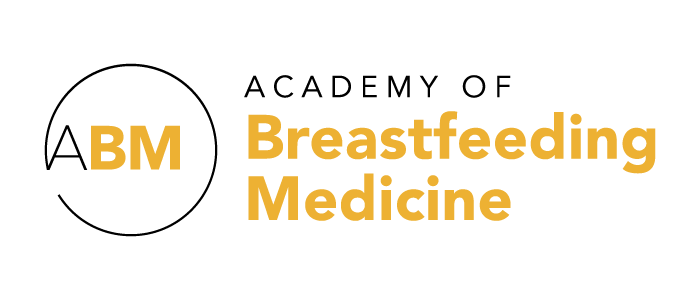
Considerations for covid-19
vaccination in lactation
December 14, 2020: Several countries have recently issued an emergency use authorization (EUA) for the Pfizer/BioNtech mRNA COVID-19 vaccine. A second mRNA COVID vaccine, manufactured by Moderna, will be reviewed in the coming weeks. Since these two vaccines are similar, the information in this document can be applied to both vaccines.
Although there is currently no clinical data on use of COVID-19 mRNA vaccines in lactation, the United States Food and Drug administration EUA left open the possibility of administering the vaccine to both pregnant and lactating individuals.
Many lactating individuals fall into categories prioritized for vaccination, such as front-line health care workers. The Academy of Breastfeeding Medicine does not recommend cessation of breastfeeding for individuals who are vaccinated against COVID-19. Individuals who are lactating should discuss the risks and benefits of vaccination with their health care provider, within the context of their risk of contracting COVID-19 and of developing severe disease. Health care providers should use shared decision making in discussing the benefits of the vaccine for preventing COVID-19 and its complications, the risks to mother and child of cessation of breastfeeding, and the biological plausibility of vaccine risks and benefits to the breastfed child.
These conversations are challenging, because the Pfizer/BioNtech vaccine trial excluded lactating individuals. As a result, there are no clinical data regarding the safety of this vaccine in nursing mothers. However, there is little biological plausibility that the vaccine will cause harm, and antibodies to SARS-CoV-2 in milk may protect the breastfeeding child.
The vaccine is made of lipid nanoparticles that contain mRNA for the SARS-CoV-2 spike protein; the mRNA sequence only encodes this protein. These particles are injected into muscle, where the nanoparticles are taken up by muscle cells. These muscle cells then transcribe the mRNA to produce spike protein. The spike protein made by the cell stimulates an immune response, protecting the individual from COVID-19 illness.
During lactation, it is unlikely that the vaccine lipid would enter the blood stream and reach breast tissue. If it does, it is even less likely that either the intact nanoparticle or mRNA transfer into milk. In the unlikely event that mRNA is present in milk, it would be expected to be digested by the child and would be unlikely to have any biological effects.
While there is little plausible risk for the child, there is a biologically plausible benefit. Antibodies and T-cells stimulated by the vaccine may passively transfer into milk. Following vaccination against other viruses, IgA antibodies are detectable in milk within 5 to 7 days. Antibodies transferred into milk may therefore protect the infant from infection with SARS-CoV-2.
Although the biology is reassuring, for definitive information, we will have to wait for data on outcomes once the vaccine is used in lactating individuals and their children.
According to the CDC Advisory Committee on Immunization Practices, with the exception of small pox and yellow fever, vaccines during lactation do not affect the safety of breastfeeding for the mother or her child.
The ABM urges vaccine manufacturers to include data for lactating individuals and their children in periodic safety reports. Furthermore, we strongly recommend that future research studies routinely include pregnant and lactating participants. We must protect pregnant and breastfeeding people through research, not from research.
|